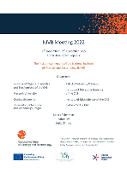Gut Microbiome Diversity of Porcine Peritonitis Model of Sepsis

Autor
Kraftová, Lucie
Šímová, Šárka
Datum vydání
2022Publikováno v
Czech Chemical Society Symposium SeriesRočník / Číslo vydání
20 (6)ISBN / ISSN
ISSN: 2336-7202Informace o financování
MZ0/NV/NV17-29239A
MSM/EF/EF16_019/0000787
MSM//LX22NPO5103
Metadata
Zobrazit celý záznamAbstrakt
Animal models are essential in understanding of the mechanisms of sepsis moreover the development and the assessment of emerging therapies. In clinically relevant porcine model, however, a significant variability in the host response has been observed among animals. Thus, there is astrong demand to better understand the potential sources of this heterogeneity. In this study, we compared faecal microbiome composition of 12 animals. Three samples were collected at different time points from each animal. Bacteriome was subjected to 16S rDNA profiling. Asignificant difference in bacterial composition was associated with the season (p<0.001) but not with the sex of the pig (p = 0.28), the timing of sample collection (p = 0.59), or interactions thereof (all p > 0.3). The seasonbatchexplained 55% of the total variance in the bacteriome diversity. The seasonterm was highly significant from the high-resolution level of the bacterial amplicon sequencing variants up to the level of phylum. The diversity of the microbiome composition could significantly influence experimental model of sepsis, and studies are warranted to demonstrate the effects of gut microbiome diversity on the host-response. If confirmed, control of the gut microbiome should become a standard part of the pre-clinical sepsis experiments.
Klíčová slova
microbiome, sepsis, porcine model
Trvalý odkaz
https://hdl.handle.net/20.500.14178/1966Licence
Licence pro užití plného textu výsledku: Creative Commons Uveďte původ 4.0 International




